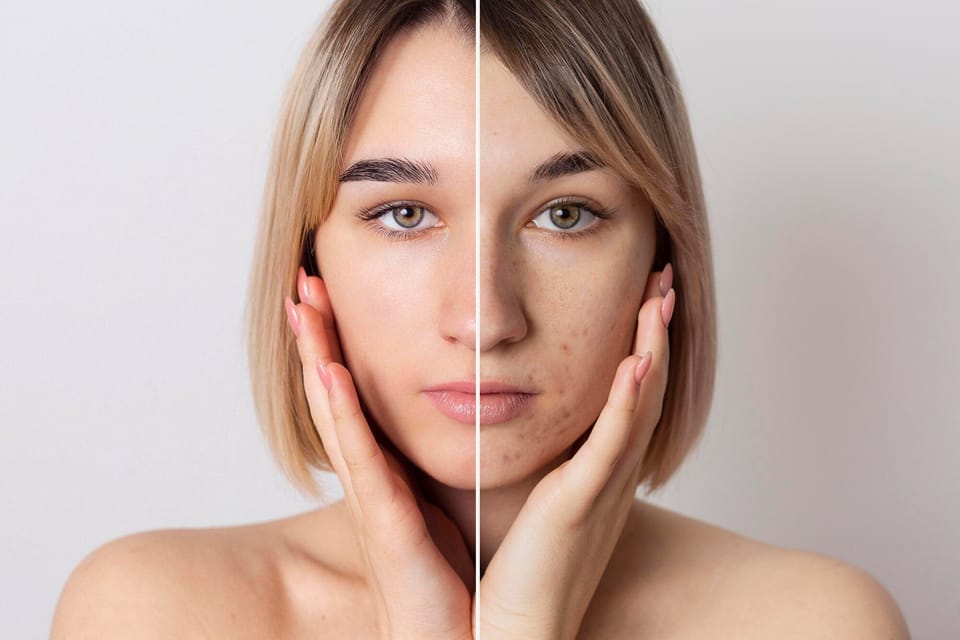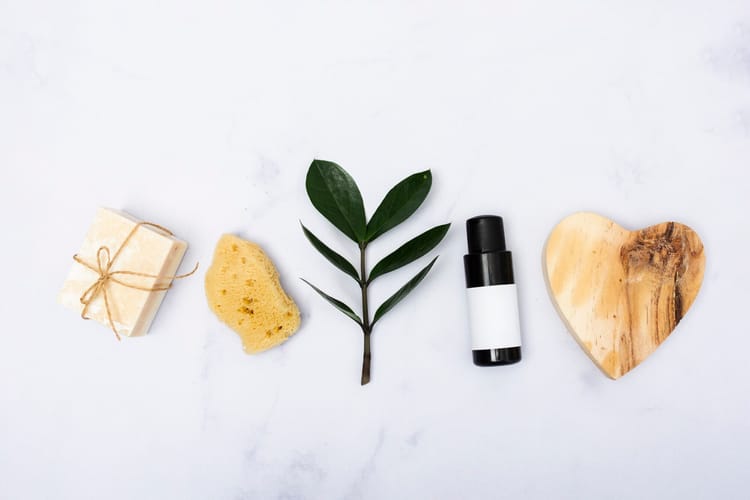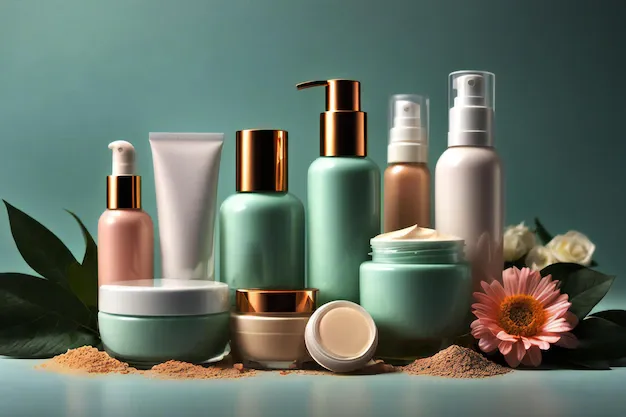𝗙𝗿𝗼𝗺 𝗗𝘂𝗹𝗹 𝘁𝗼 𝗗𝗲𝘄𝘆: 𝗛𝗼𝘄 𝘁𝗼 𝗥𝗲𝘃𝗶𝘃𝗲 𝗬𝗼𝘂𝗿 𝗦𝗸𝗶𝗻 𝘄𝗶𝘁𝗵 𝗧𝗵𝗲𝘀𝗲 𝗦𝗶𝗺𝗽𝗹𝗲 𝗦𝘁𝗲𝗽𝘀 ✨

In a busy, polluted, and stressful world, our skin can suffer, resulting in dullness. By adopting the right skincare routine and habits, you can turn dull skin into a radiant, dewy complexion.
This article explores easy steps to rejuvenate your skin and attain a healthy glow.
Ⓖⓔⓝⓔⓡⓐⓛ Ⓒⓐⓡⓔ :

💗Step 1: Cleanse and Exfoliate
The foundation of any skincare routine is proper cleansing. Start by using a gentle cleanser suited to your skin type to rid your skin of impurities and buildup. Incorporating exfoliation into your routine 2-3 times a week helps slough off dead skin cells, revealing a fresher, brighter complexion underneath.
💗Step 2: Hydrate Inside and Out
Hydration is key to achieving dewy skin. Drink an ample amount of water throughout the day to keep your skin hydrated from within. Additionally, use a hydrating moisturizer that suits your skin type to lock in moisture and plump up your skin, giving it a healthy glow.
💗Step 3: Protect with Sunscreen
Sun damage is a major contributor to dull, aging skin. Make sunscreen a non-negotiable step in your skincare routine, even on cloudy days. Opt for a broad-spectrum sunscreen with at least SPF 30 to shield your skin from harmful UV rays and prevent premature aging.
💗Step 4: Incorporate Serums and Treatments
To target specific skin concerns and boost radiance, consider adding serums and treatments to your regimen. Vitamin C serums help brighten the skin and even out tone, while hyaluronic acid serums provide intense hydration, leaving your skin plump and glowing.
💗Step 5: Get Adequate Sleep and Manage Stress
Beauty sleep is not just a myth – it's essential for skin rejuvenation. Aim for 7-9 hours of quality sleep each night to allow your skin to repair and regenerate. Managing stress through relaxation techniques like meditation or yoga can also help prevent skin dullness caused by cortisol, the stress hormone.
Ⓔⓧⓟⓔⓡⓣⓢ Ⓣⓘⓟⓢ :

💚1.Double Cleansing: Consider incorporating the double cleansing method, which involves using an oil-based cleanser followed by a water-based cleanser. This helps thoroughly remove makeup, sunscreen, and impurities, ensuring a clean canvas for your skincare products to work effectively.
💚2.Use a Facial Mist: Keep a facial mist handy throughout the day to refresh and hydrate your skin. Look for mists containing ingredients like rose water or aloe vera to soothe and revitalize your complexion, especially during long hours in air-conditioned environments.
💚3.Incorporate Antioxidants: Antioxidants such as vitamin E, green tea extract, and resveratrol help protect your skin from environmental damage and free radicals. Look for skincare products containing antioxidants to boost your skin's defense mechanisms and promote a healthy, radiant glow.
💚4.Practice Facial Massage: Stimulate blood flow and lymphatic drainage by incorporating facial massage into your skincare routine. Gently massaging your face with clean hands or a facial roller can help reduce puffiness, improve circulation, and promote a more radiant complexion.
💚5.Eye Care: Treat the delicate skin around your eyes with care. Use a hydrating eye cream to combat dark circles, puffiness, and fine lines. Applying the eye cream using gentle tapping motions with your ring finger can help prevent tugging on the sensitive eye area.
💚6.Weekly Mask Treatments: Treat your skin to a weekly mask treatment tailored to your skin concerns. Whether you opt for hydrating, brightening, or purifying masks, regular masking can provide an extra boost to your skincare routine, resulting in smoother, more radiant skin.
💚7.Healthy Diet: Remember that skincare starts from within. Maintain a balanced diet rich in fruits, vegetables, and omega-3 fatty acids to support your skin's health. Foods high in antioxidants, such as berries and leafy greens, can help nourish your skin from the inside out.
🩺 Ⓓⓔⓡⓜⓐⓣⓞⓛⓞⓖⓘⓢⓣⓢ Ⓟⓞⓘⓝⓣ ⓞⓕ Ⓥⓘⓔⓦ :

💙1.Consultation and Skin Analysis:
Schedule a consultation with a dermatologist to assess your skin type, concerns, and any underlying conditions that may be affecting your skin health. A dermatologist can provide personalized recommendations tailored to your specific needs.
💙2.Professional Treatments:
Consider incorporating professional treatments recommended by your dermatologist, such as chemical peels, microdermabrasion, or laser therapy, to address specific skin concerns like hyperpigmentation, acne scars, or fine lines. These treatments can help rejuvenate your skin and enhance its overall appearance.
💙3.Prescription Products:
If you have persistent skin issues such as acne, rosacea, or eczema, your dermatologist may prescribe specialized topical treatments or oral medications to manage your condition effectively. Follow your dermatologist's recommendations carefully to achieve optimal results.
💙4.Sun Protection:
Dermatologists emphasize the importance of daily sun protection to prevent skin damage and premature aging. In addition to using sunscreen, consider wearing protective clothing, seeking shade during peak sun hours, and avoiding tanning beds to safeguard your skin from harmful UV rays.
💙5.Regular Skin Checks:
Schedule regular skin checks with your dermatologist to monitor any changes in moles, spots, or other skin irregularities. Early detection of skin cancer or other skin conditions is crucial for prompt treatment and optimal outcomes.
💙6.Avoid Harsh Ingredients:
Dermatologists often advise against using harsh or abrasive skincare products that can strip the skin's natural barrier and cause irritation. Opt for gentle, non-comedogenic products that are suitable for your skin type to maintain a healthy skin barrier.
💙7.Hydrate and Protect:
In addition to sunscreen, dermatologists recommend using a moisturizer with hydrating ingredients like hyaluronic acid or ceramides to keep your skin hydrated and protected. Proper hydration is essential for maintaining skin health and promoting a radiant complexion.





